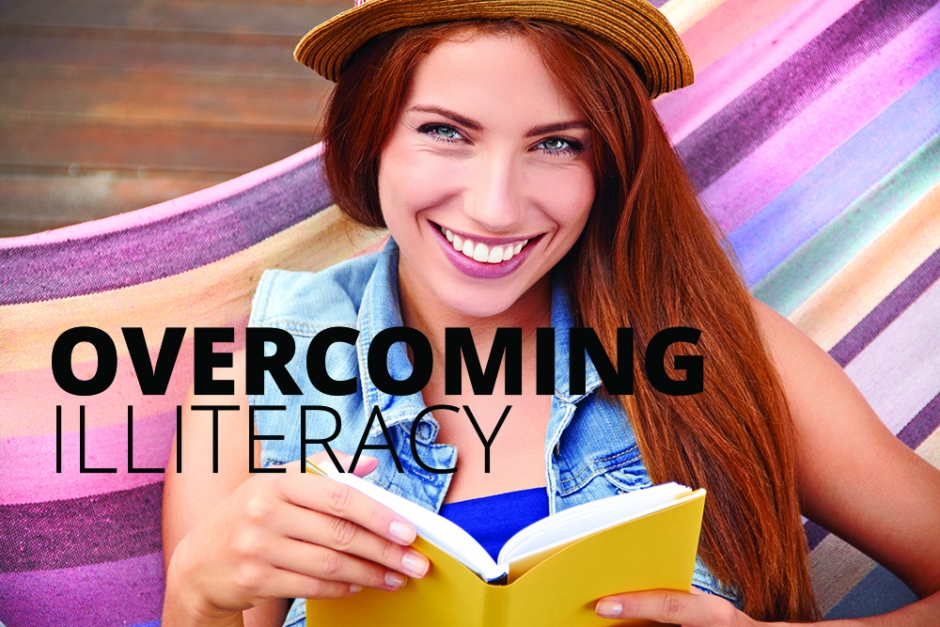On the 8th of this month, we celebrate International Literacy Day. Illiteracy is something many people think of as a problem of the developing world, but many people in first world countries struggle with it. Paul Connolly gives us a firsthand account.
I’m sitting writing my new book, Beating the Odds. My laptop tells me, “I do not have a clue what you are trying to spell.” I call for my wife – this is when she normally helps me – but she is in the shower and cannot hear me. Harley, my oldest son, comes into the kitchen. He is nine years old.
“What’s up, Dad?” he asks.
“I am on a roll with this book, son, but I am stuck with the spelling and I need to use these words to express myself.”
“I can help you, Dad.”
He stands next to me and puts his arm around me, and all of a sudden I am the little boy and he is the loving father as he spells the words for me. I get a quick look at what it must have been like to grow up in a loving family. As I start to cry, my little boy hugs me and tells me everything will be okay.
Let me tell you about illiteracy. Not being able to read or write is horrible. It gets you when you’re not looking. It can leave you humiliated, disadvantaged, even in danger. I swung the car around a corner in Miami once and found myself facing a roaring four-lane stampede of traffic, just because I couldn’t read the red and white sign that said ‘No Entry’. When I was in my mid-twenties, I couldn’t do things most eight year olds take for granted.
Years later, when I’d been to night school and learned the basics, A promotion I had been offered to a senior management job was withdrawn when my employers realised I would need help with the paperwork.
Even now, I hide from menus in restaurants: “What do you fancy? Ah, yes. I think I’ll have a bit of that, too.”
So I know what it means when Beanstalk’s volunteers get another youngster over the hurdle, reading and writing and joining in with everybody else. Every one’s a victory. Every one’s a life opened up to new possibilities.
And I know how much effort, training, organisation and energy goes into helping more than 6,000 children every year. So I was amazed when Beanstalk CEO Sue Porto told me about the organisation’s target of making that 18,000 by 2017.
That’s a really ambitious goal, and more of the same won’t be enough to get them there. Beanstalk needs to think big, with more volunteers, more funding, and more publicity. It also needs more of a voice, and that’s where I come in.
I’ll talk to anybody, almost anywhere, and I can get people’s attention. They’ll listen to me because I’m the guy who really couldn’t read at all until his mid-twenties. I couldn’t write a word back then, let alone a foreword.
And then, a few years ago, I told my story – about the illiteracy and abuse that dogged my childhood – and I suddenly turned into a best-selling author. The irony was irresistible, and the media loved the happy ending. Writing, eventually, gave me a voice.
So I’ll be talking – shouting, if necessary – to get the message across. Today, thanks to my choice to get to a better place in life, the available resources, and the kindness of a few teachers and mentors, I am able to write this important message: literacy matters. I am a living story of how illiteracy can waste a person’s potential and how the ability to read and write at even a basic level opens doors of opportunity and releases all kinds of exciting potential.
Beanstalk is a national children’s charity that recruits volunteers and trains them to work in primary schools with children who have fallen behind with their reading. Last year, Beanstalk worked with 7,350 children across England and they hope to help 18,000 children struggling with their reading by 2018. The main patron for Beanstalk is The Duchess of Cornwall.
I am a fitness trainer who has been an ambassador at Beanstalk for three years, and my speech about my childhood abuse moved the crowd to tears and even prompted someone to bid £100,000 for a sketch of Margaret Thatcher in Lord Archer’s auction.
We were sitting there with our mouths wide open. I got a standing ovation after my speech. Up for auction was the last sketch of Margaret Thatcher before she died, and the person who bought it said they were so moved by my story that they just had to donate the money.
£25,000 of the auction will go to the charity, with £75,000 going to the artist.
Sue Porto, Beanstalk’s CEO, said: “It was fabulous to witness the fantastic generosity and spirit on the night. Funds raised will help to drive the charity forward so that we can reach out to more children to ensure that no child grows up without the skills they need to read, grow and succeed.”
It is time we end this unnecessary waste of lives. There was a time when I could not imagine what it would be like to be able to inscribe onto paper my own imagination, or to be able to read other peoples’ thoughts. We take for granted what a miracle it is that we can literally read another person’s imagination and to take part in the creative process that literacy makes possible. Imagine with me a world where no child is denied that opportunity. Imagine a world where no one has limits to his or her imagination.




